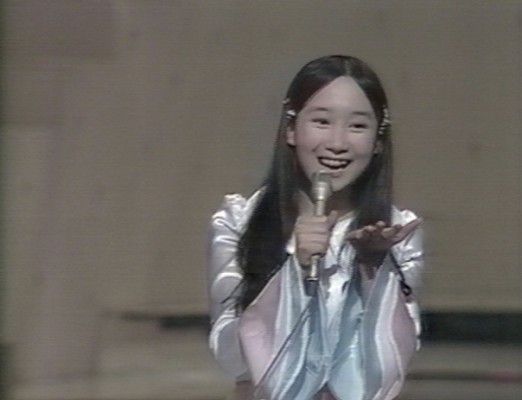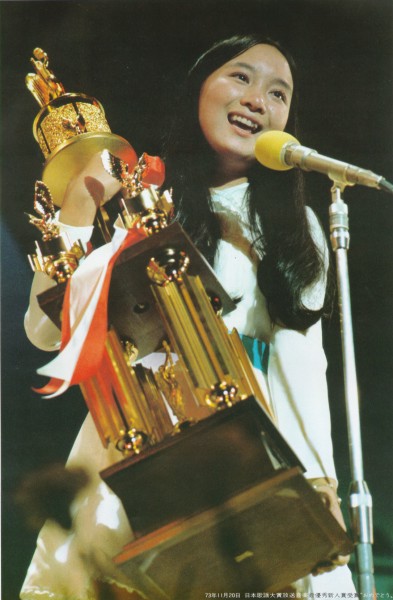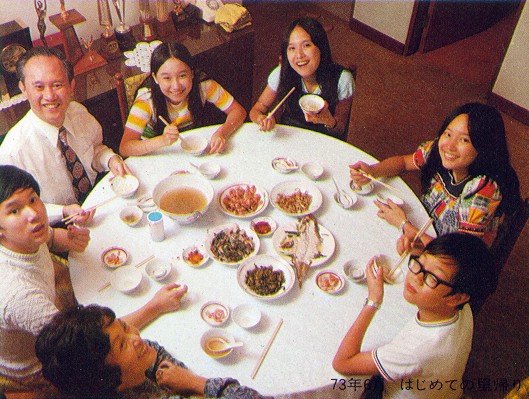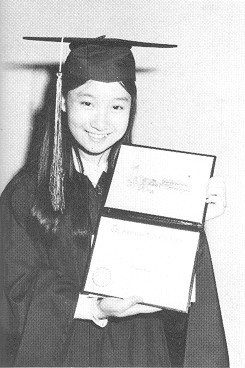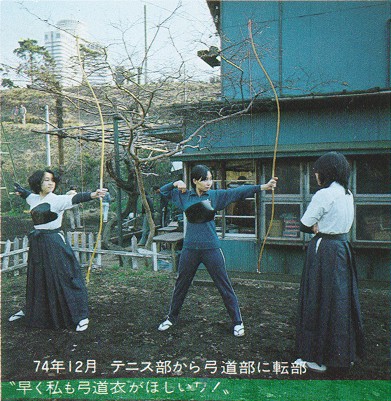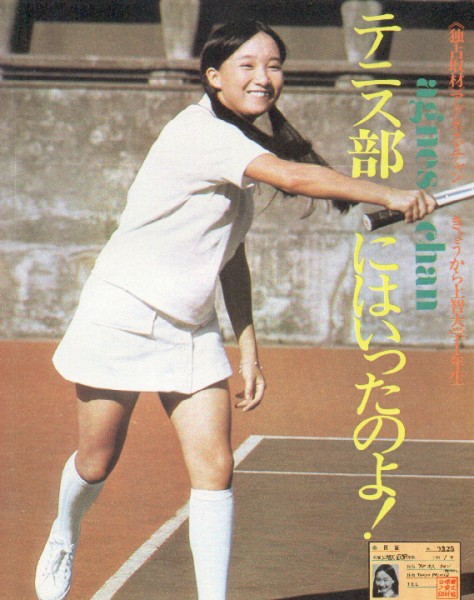|
Chapter 5 |
|||||||||||||||||||||||||||||||||||||
| Agnes has gained more and more popularity and among other new
faces who debuted at the same time with here are 桜田淳子 Junko Sakurada, 森昌子
Masako Mori and 山口百恵 Momoe Yamaguchi, who debuted as Chu-san Trio. But Agnes was a solo act against their popularity. Her popularity was among people of all ages and genders, particularly
elementary and junior high school students. In addition, many of so-called
"character products" were made and marketed under her name and feature her Unfortunately, Mari's popularity was declined right after 1976. Many said that Agnes had a major impact on the fall of her popularity. According to a book published by Mr. 桑原稲敏 Inatoshi Kuwabara, a reporter, "Mari Amachi got a sever blow by the rise of Agnes Chan who belonged to the same agency as her, Watanabe. Young fans of Japanese pop music always want new idol. The newly-discovered Agnes had the quality which made these fans fulfills their dreams. Exoticism of her birth place such as Hong Kong, her small and pretty figure, and her sweet smile. As a result, the elementary and junior high school student fans who used to be at Mari Amachi camp were quickly move toward this new idol.
|
|||||||||||||||||||||||||||||||||||||
|
Present project of a soft drink
|
As a singer, Agnes' main activity, was smoothly continued to make hits.
She released singles at the pace of one per four or five months after her
debut. (See Table 1) The basic style of her music was already shown in her
debut song: Folk song based with a cheerful sound, so-called "Agnes sound," was steadily followed after her debut song. Her debut song and the follow-up "妖精の詩 Yousei no Uta" reached the fifth on the hit chart, but the third single "草原の輝き Sougen no Kagayaki" hit the second and the forth single "小さな恋の物語 Chiisana Koi no Monogatari" reached the long-awaited number one. It reached the bestseller of 580,000 copies.
In other word, it means that 580,000 people accepted her music. Mr.Masaaki Hirao, who composed many songs for her such as "Sougen noKagayaki," "星に願いを Hoshi ni Negai wo" and others, though who declined to compose her debut song praise Agnes as "Not just an idol but is a girl with talent and musical ability." Some songs since her debut one were symbolic and poetic and she had a bit complaint about those because she started off as a folk singer. But by her claim, song became to change song by song to straightforward love song. Those were not her own works and for this reason, those included what were incompatible with her feeling she wanted to convey, but in its own way, she enjoyed the finding process of her own self who could sing such songs. |
||||||||||||||||||||||||||||||||||||
| Agnes made a clean sweep of the new face of the year award in 1973. And
the finish was the appearance on the program"紅白歌合戦 Kohau Uta-gassen." This program was also aired in Hong Kong and many other countries, and she
knew only this program among the Japan made ones. She appeared on this big
24thNHK's Kohaku Uta-gassen (1973) |
the best new face of
the year award in broadcasted
|
||||||||||||||||||||||||||||||||||||
|
And now, Agnes' achievement in music is to have combined Japanese pop
music with new music (pop music for young people based on folk song). In
her 5th album "アグネスの小さな日記 Agnes no Chiisana Nikki,"キャラメル・ママ Caramel Mama, 加藤和彦 Kazuhiko Kato and
son were appointed and after that, ムーンライダーズ Moon Riders, ハイファイセット Hi-Fi Set 矢野顕子 Akiko Yano and so on were appointed as backup musician. In terms of only record sales, even Agnes boom completed the first Stage
at her 8th single "愛の迷い子 Ai no Mayoigo" (1974). Including this, 5 songs of 8 songs which were released by 1974, appeared on the top 100 hit Another distinctive feature of Agnes' activity in show business in Japan
was that she periodically went back to Hong Kong for renewal of her visa.
She visited Japan using entertainer visa. This visa requires its holder to
Agnes went and returned between Hong Kong and Japan six times in total.
I don't know it's a accident or not, the time when she went back to Hong Kong
did not coincide as such with the time of spring, summer and Winter Her return to Hong Kong also meant her days off. But of course it was not
become her holiday. She was still required the show business activity in
Hong Kong and had to be interviewed by reporters who visited Hong Kong from
|
|||||||||||||||||||||||||||||||||||||
|
Her first return to Hong Kong, 1973.
|
|||||||||||||||||||||||||||||||||||||
| Her activities in Hong Kong were hard due to the limitation of her
staying. In her six returns to Hong Kong, she appeared on one TV drama (
an hour program, 30 series
), three movies, and released seven albums (
except same titled albums released by different record companies). She also appeared in another HK movie with the filming location in Japan while she was staying. It went on without mention that she also did interviews with many press, magazines, appearances on many TV programs and others. For Agnes as an idol, singing was not all of her activities. Her own radio program was started at the end of 1973 and her own TV program was started at the beginning of 1974. Not only her songs but also her lovely character was supported by fans. Those went on the air and rushed through Japan. And in Japan too, she continued to appear on TV dramas and in movies. She released a collection of poems with illustrations. Agnes was steadily walking on the royal road of idol. On the other hand, as Agnes promised her father, she had not ignore her study in Japan too. She graduated from the American School and effortlessly got a transferred to as a highest-grade student , on June 15th, 1973. |
With her diploma in her hand |
||||||||||||||||||||||||||||||||||||
| On Sept. 10th of the same year,
she entered the International Division of Sophia University and with a major in psychology. Though she had a busy
schedule, she enjoyed the campus life, participating in the tennis club or
Japanese art of archery club, for example.
Japanese art of archery club |
At tennis club
|
||||||||||||||||||||||||||||||||||||
| If an idol's popularity is high, but he doesn't vary in character for along time, he gets the time when people get tired of him some day.
Of course, there is a fan psychology to want him not to change all the time,but general public have volatile emotions. This prompts metabolism in the
world of show business. Agency, a vender, considers a variety of means to
keep the freshness of its "product." This is an image makeover.
And entering in 1975, when she turned 20 years old, "白いくつ下は似合わない Shiroi Kutsushita wa Niawanai" appeared. When she sang this song, she changed the part in her hair from the center
to the right side. It was so small change, but it caused a
sensation among her fans. However, it favorably-received by them after all. Agnes could try
|
|||||||||||||||||||||||||||||||||||||
|
And now, while
Japan were getting excited with Agnes boom, how did she feel like? She
mentioned about it in some her books, and I'd like to describe about it
below based on those.
For Agnes Chan as a "singer", song was not an objective, that is, it was not an object of her business, and it was no more than one of means for communication. Of course, the environmental surrounding her dealt with her song as
business, but it is question how far she herself was aware of it. Because
she is sagacious, she must have well known what was happening around
herself. But, at least for her, to sing a song and get people to listen to
it must have been primary, and she must have been not so much conscious of
the business side of song itself. It's because she was a minor in Japan at
the time (minor in Japan is under 20 years old), and left all of the
contracts with the agency and others, and her monthly income (estimated at
two million yen just before her temporary retirement) to her father, and
herself barely touched those. Herefrom, it's considered that she attached
importance mostly to her music activity itself among her activities in
Japan. She did not have a sense of working student who worked her way
through college, but had a sense of ordinary student who continued study
doing something of a part-time work. For that matter, the reason why Agnes went to Japan is that she thought to
try how far her thought got through or how far she was accepted in
"miracle" Japan, rather than business. For this reason, at first she had a
sense of amateur or its extension, folk singer. But, her activities in Japan became completely far removed from her
thinking. As soon as mass media knew the public had accepted her, it
caught at her and began to drive her hard. The situation that her work and
study cut her sleeping time severely immediately came to her. The mass media required her not only song but also various things. It
tried to deal her not only as a "singer" but also as an "idol." For Agnes,
it was not her true intention. Some sort of friction was quickly produced
between her and her staffs who brought her such jobs. At the threshold of her visiting Japan, language was a barrier between
them. Bad communication made her grow irritation. It was particularly
painful for her that she had to follow the lead of the agency at its beck
and call as one of the "product" of it in spite of the explanation not
being done well. The problem of language was gradually cleared up after
that, but the situation that the agency led her activities and her opinion
was hardly accepted, was unchangeable. Agnes was originally not good at making friends, so she could not have
friends she could talk frankly with in an unusual circumstance of the show
business world. She was out on a limb in Japan. "It's only myself who
protects me." "I'm become a loser if I give even an inch." She
strengthened her attitude of confrontation against people around her. Even
if trouble or something happened, she did not yield an inch. If her staffs
had had minds which tried to understand her surroundings or her opinions,
they should have avoided most of conflicts. But unfortunately, they
didn't. If anything, she was not good at asserting herself, so it was a
tall order for her to argue with them in accustomed Japanese. As a result,
she came to take an attitude like shutting herself away. Her such attitude
gave the impression that she was difficult and somber to the people around
her. Warmth became rare in the relationship between her and the staffs and
the relationship became businesslike. This was not her intention and
became one of the causes that increased her irritation. Of course, there must have been a matter of partner's suitability.
Actually, she put her trust in the manager, Mr.森裕平 Yuhei Mori or
above-mentioned Mr.Ogi. It is controversial whether it's necessary for business to get further
into personal relationship, or not. It would be necessary at one stage and
unnecessary at other stage, depending on the situation or participants'
personalities. In the case of the relationship between Agnes and her
staffs, another situation might have developed if they had made concession
of one step closer or even a half step. If there had been just a little
more efforts… It was true for the staffs and, to tell the truth, for Agnes
herself. It was really unfortunate that those efforts could have been done
well due to various reasons. Such Agnes, however, never boycotted her job on the spot. Whatever had
happened, she returned to her job scene at the end. "… I think she is a
very professional singer in that way. Even if she had strife with her
staffs or something like that, once she stands in front of camera or on
the stage, she goes the whole way until she satisfies herself. In my
experience, such type of singer is 沢田研二 Kenji Sawada for man, and Agnes
for woman." Mr. Ogi also evaluates her like this. Such her attitude was
backed by her sense of responsibility for people who came to see her, and
her personality could never betray them. Moreover, because she deemed that
her fans were friends of hers who understood her, she was unable to do all
the more. For Agnes, who could not become familiar so well with people in accustomed
show business world of Japan, who was tormented by loneliness in spite of
being surrounded by many people, and who always had to suffer from
melancholy, the contact with fans was the only occasion on which she could
get herself together and take a breath. This was what she expected. She
well knew that she was considered not only just as a singer but also as an
idol. Even so, all fans, such as tender elementary school children who
yearned her saying that "Agnes, Agnes," and youths who gave unstinted
enthusiastic cheers, were equally her precious friends. Above all, she
cherished the bonds between those fans and her, even though some of them
came to her boss' house where she lodged with and disturbed her important
sleep. She believed that only they understood her. Needless to say, the
means of communication with them was song. But her thought on song began to change. Business orientation became to
come to the front as she got accustomed the work and got acquainted with
it. It owed to the encounters with good music producers or directors, and
she, herself, started thinking to develop her own musical talent and to be
a full-scale musician or artist. At the same time, an entertainer
orientation which tried to involve not only singing but also showing, came
out. Of course, those were backed by her thoughts that she wanted to
deliver good song or impressive music to more people, and it was all well
and good. However, her pure feeling for song she had in the beginning hid
behind that. For Agnes, song should have not been a "work." And "singer" should have
not been an objective of her life. Her dream, or the objective of her
life, should have been to "be a elementary school's teacher or a counselor
for young people, or open a kindergarten." For those reasons, she majored
psychology at the Sophia University. And the reason that she had a hope to
change her university from Sophia to Canada's university is that only the
bachelorship which was received from English university like Canada's,
were acceptable in Hong Kong. She did not forget those. But it was almost
impossible to bring those into shape in her environment at the time. And
this should have been one of he worries. But her thought was gradually
changing. It's rather natural that one's thinking changes as he gains experiences
and this is not denied at all. But for Agnes, the problem is whether the
change of her thought was a result of her mature reflection, or not. If
the change of her thought was caused by the unconscious confirmation and
self-justification of her situation due to her busyness, there is nothing
so unhappy like this. And there is another thing. The volunteer activities she had felt
enthusiastic about. She had continued her activities regularly, but it got
extremely fewer that she visited facilities publicly. It was reported at
most that the visit to a Hong Kong's facility in 1974, her second return,
the visit to a facility in Kyoto in December of the same year and the
visit to Nagoya Public School for the Blind in Aichi in March, 1975. That
should have been her grass roots and the starting point with song. Those
thoughts must have flashed through her mind, but it was helpless for her.
She no longer lived in the different world that they did. She had mixed
feelings, but even those were being buried deep into her conscious mind.
"Where do I go to at all? Who am I at all?" A woman, 陳美齢 was in agony.
But, her precious time for speculation to make her self-clear by looking
at and to become an individual human being, was already lost.
"Agnes Chan," who was always at the center of people and was loved, was
just a fictional present, or a well-made marionette. 陳美齢, the actual
existence, lost her patience with her such situation. "I want to do on my
own what I want to do. I want to do by myself common practices common
woman does. I want to be myself." Those thoughts made her be in anguish.
But Agnes gradually became tending to lose herself in such life that every
day was passing like being on a roller coaster because of her doubling as
student and idol. She was not unaware of herself who sounded a warning
that "No, no!" but, she already had no room to stop and think. Agnes was too intellectual to live by the dictates of her sensitivity. At
the same time, she was too rich in sensitivity to live intellectually.
Agnes, who was born in Hong Kong, a contact point between East and West
and learned Western way of thinking based on the traditional Chinese
ideas. Agnes, who had the affection of her parents and grew to an earnest,
single-minded and curious girl. When such Agnes appeared with pretty look
in the years of 1970s, her destiny was decided. The Fates dragged her
about whether she liked or not. The Fates take no notice of a girl's
happiness or unhappiness, but it is a serious problem for the girl
herself. But it was helpless for her even if she was aware of that. Her
destiny washed her down like mighty river and showed no sign of slowing
down. |
|||||||||||||||||||||||||||||||||||||

